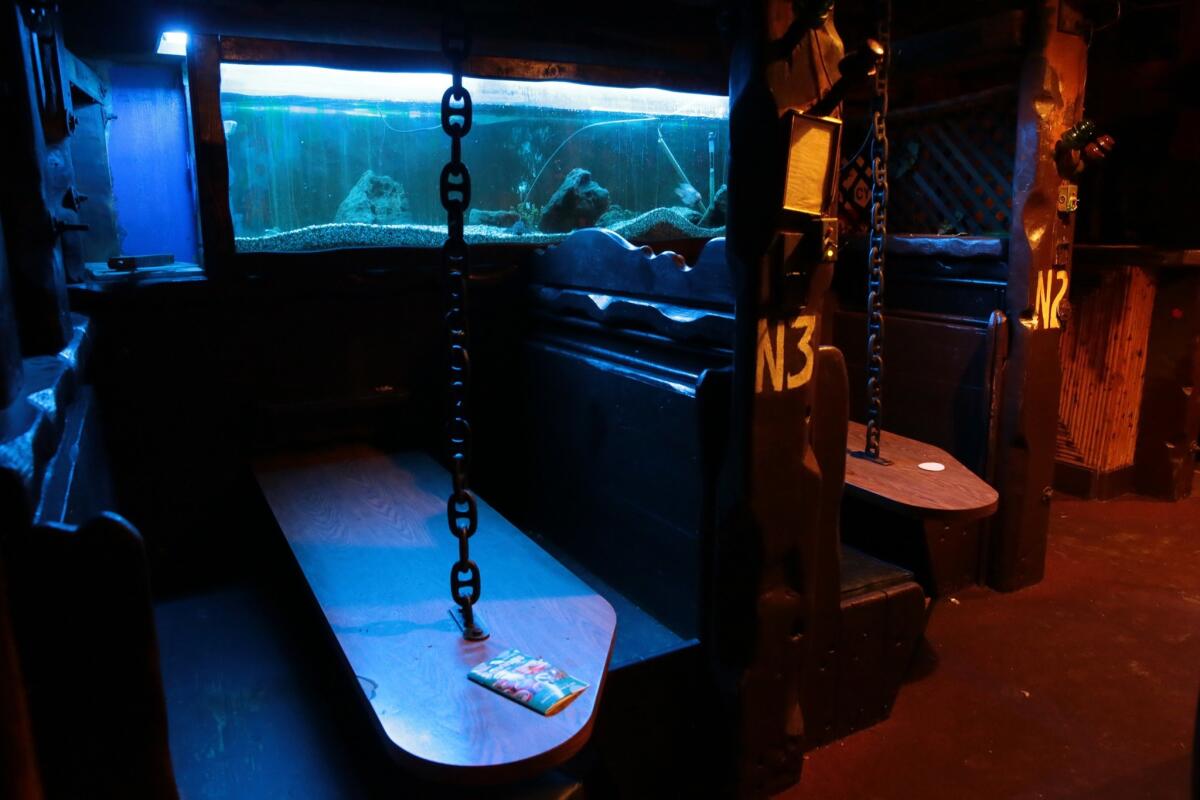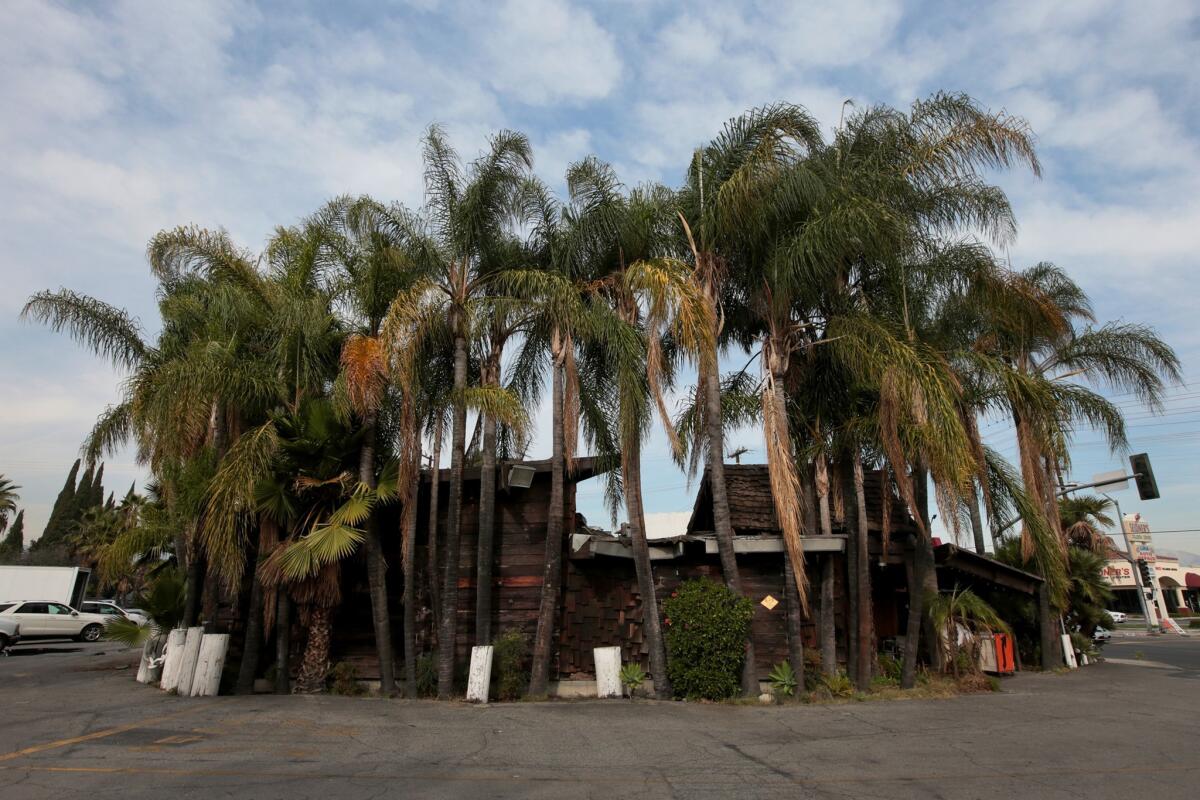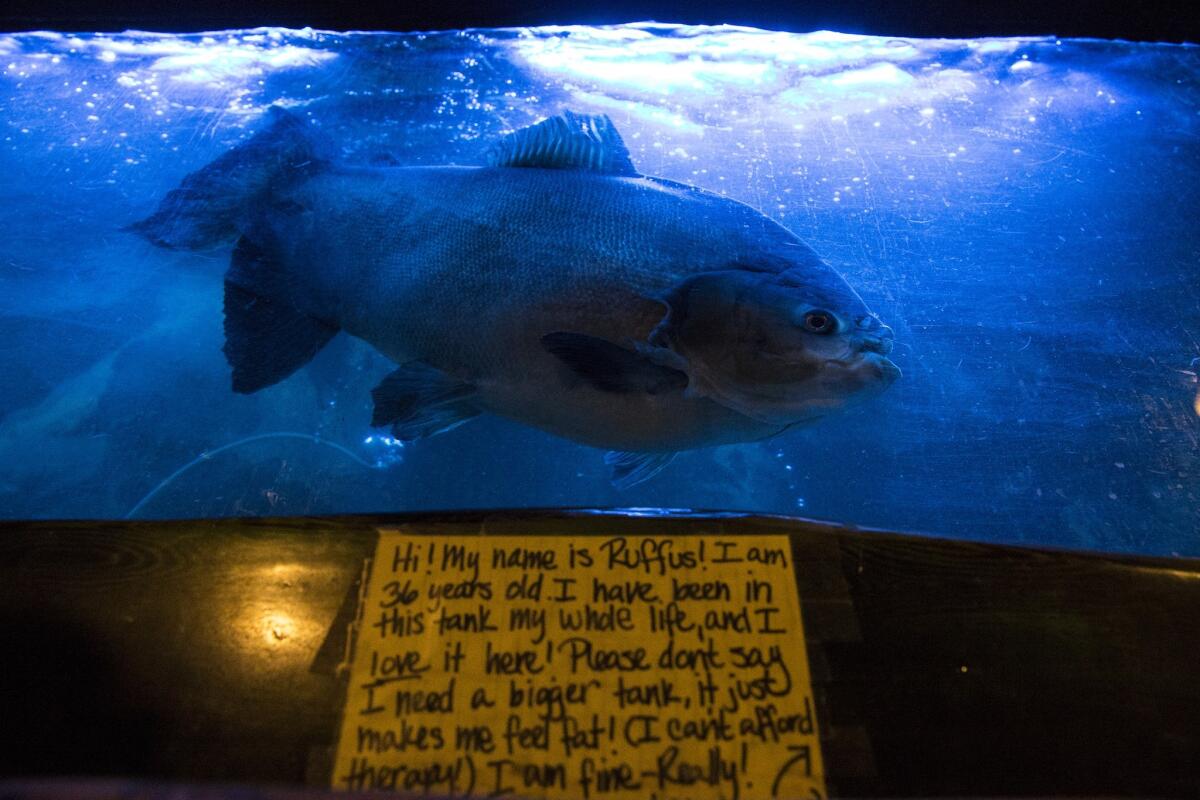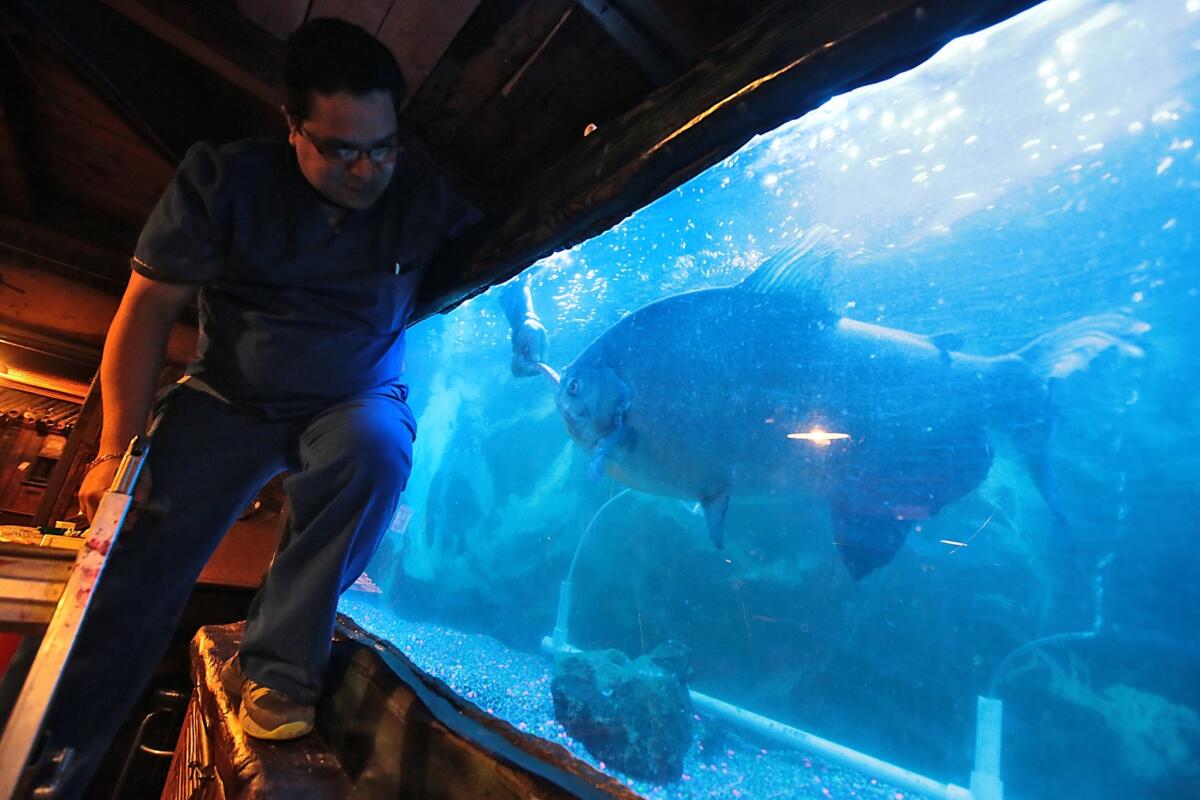Tiki restaurant is hooked on Rufus, an old fish with quite a tale
Bahooka restaurant in Rosemead has closed, and the owners have to decide what to do with the iconic pacu fish known as Rufus. Yes, he’s 37.
- Share via
For decades, Rosemead tiki restaurant Bahooka drew crowds with its incredible aquatic menagerie of more than 1,000 creatures: red devils, silver dollars, sharks, goldfish and koi, so many it was as if you were eating underwater.
There was the turtle that swam up to your margarita at the aquarium bar. The giant gourami floating serenely behind the bartender. And Rufus, a huge, elderly pacu fish who greeted everyone who came in.
Rufus watched many of the restaurant's diners grow up. As children, they clamored to host their birthday parties at Bahooka. Later, the restaurant's shadowy booths saw their first dates and hid their first kisses. The same kids celebrated their 21st birthdays at Bahooka, taking their first sips of alcohol at the aquarium bar.
But Bahooka closed last March, and the new owner still hasn't decided what to do with all the fish. For nearly a year now, Rufus and the others have been living in the abandoned restaurant, a dim warren of dark scarred wood and burbling water.
Jorge Mastache, the restaurant's fish keeper since 2001, has been feeding them and cleaning their tanks after he gets off work. On a recent weeknight, Mastache unlocked the side entrance and entered through the kitchen.
Bahooka hasn't aged well. Like the rusted boats in the parking lot, the restaurant has lost its seaworthiness. Loose plugs and old decorations hang like dead kelp from the walls of the dining room. Brightly colored aquarium gravel crunches underfoot. The place smells as a shipwreck might.
Mastache steps around row after row of glowing fish tanks. When he nears a large blue-tinted tank near the restaurant's front, Rufus swims up to investigate, his soft wrinkled nose pressed flat against the glass.
Rufus is getting old, too. His fins are fraying, and his face is scarred. When Mastache flips on the aquarium light, there is no aggressive hunter cutting through the water — only an old fish heaving himself across an 8-foot-long tank, scouting for floating carrots with unblinking eyes. At 37, he has lived roughly twice as long as he would have in the wild.
Mastache drags a trash can to the aquarium, stepping over a punctured purple birthday balloon. He removes the filter and washes each piece individually, catching the dirty water in the can. He checks the fish's eyes to make sure they're not cloudy. Then he feeds Rufus a carrot, tapping on the glass to guide him.
"Rufus," Mastache said, "he is an important fish."

When Bahooka closed, everyone assumed the new owner would integrate Rufus and the other fish into a new tiki restaurant. But the property has changed hands twice since Bahooka was shuttered. More photos

When Bahooka closed, everyone assumed the new owner would integrate Rufus and the other fish into a new tiki restaurant. But the property has changed hands twice since Bahooka was closed. The idea for the proposed restaurant keeps evolving.
Two weeks ago, the current owners decided to fast-track plans to turn the place into a Chinese restaurant, said Alan Zhu, a restaurateur who's a partner in the new business. A lot of work must be done before the space will pass building and fire inspections, Zhu said. Rufus and the rest of the fish will have to be removed.
Bahooka fans have plunged into action. A thread was posted on tikiroom.com, and enthusiasts started to ask nearby tiki restaurants to take Rufus. Someone gave Rufus a hashtag on Twitter: #saverufus. More than $2,700 in crowdfunding has been raised to relocate him.
But there is growing disagreement about where he should go. The tiki enthusiasts hope Rufus will go to another tiki restaurant — perhaps Don the Beachcomber in Huntington Beach or Damon's Steak House in Glendale. But Mastache fears that the fish won't survive the move. Rufus' new owner is leaning toward keeping him to decorate the new restaurant, Zhu said. He doesn't want the fish to die, either.
"Rufus is an icon. Everybody knows him," said Lynn Garrett, founder of Hidden LA, a group that has helped raise money for the fish's move. "And for people who live in the San Gabriel Valley, Rufus is like their childhood."
Rufus looms particularly large in the tiki subculture, enthusiasts say. He lurked moodily in the background as Johnny Depp tried to score drugs in "Fear and Loathing in Las Vegas." He's starred on the Food Network and appeared in movies such as "23" with Jim Carrey. His face is even on a collector's mug listed for $125 on EBay.

Overgrown palm trees encircle Bahooka, which hasn't aged well. Like the rusted boats in the parking lot, the restaurant has lost its seaworthiness. More photos
With tiki restaurants on the decline, Rufus has become an important symbol for tiki fans, said Tom Thordarson, a Pasadena illustrator.
When Thordarson found out that Rufus had been living in the abandoned restaurant, he drew a cartoon of the fish looking mournfully into a crumbling restaurant. The image has been shared widely on the Internet.
"He's like the spirit of the tiki magic that we all want to save, that is quickly being taken away," Thordarson said.
Mastache says his main concern with a move is that Rufus will not survive. And, Mastache admitted, he would miss his companion of 13 years.
"I don't think I want Rufus to go," he said.

[Rufus is] like the spirit of the tiki magic that we all want to save."— Tom Thordarson
The restaurant's current owners have expressed surprise that a fish could arouse such passions. But to many, Rufus is the only living reminder of a place that children once loved more than Chuck E. Cheese.
When word spread that the restaurant was closing, there was an outpouring of nostalgia, said Darlene Fliegel, whose husband cofounded the restaurant in a different location in 1967. The restaurant was mobbed with more customers than they'd seen in years. They even ran out of food at one point.
Before they closed, Fliegel set out some notebook paper in the waiting area for customers to share memories.
Patrons filled two large binders with notes. Many remembered the sound of Rufus' vigorous carrot crunching. Others spoke of the Frisbee-size flaming margaritas and the sweet glazed Bahooka ribs. "Simpsons" illustrator Brad Ableson left a drawing: Homer is crying as he sits down to a plate with a big fish dressed with sprigs of parsley, a Bahooka bib tied around his neck.
"Oh, Rufus! I'm going to miss you! You're so delicious!" reads the speech bubble.
On a recent weekday, Fliegel hauled three massive binders into the empty restaurant. She has saved every newspaper article that mentions Bahooka, even the ones in Chinese that she can't read.
You can trace the rise and fall of tiki culture in her binders. Tiki restaurants were popularized by returning servicemen in the 1960s, who used the imagery of the tropical islands they were stationed in to create pseudo-Polynesian escapes from daily routine. A food newsletter describing the opening of the restaurant in 1967 calls it the "wingdingiest" restaurant around.

Bahooka's current owners have expressed surprise that a fish could arouse such passions. But to many, Rufus is the only living reminder of a place that children once loved more than Chuck E. Cheese. More photos
Halfway through Fliegel's binder, the tone of the articles changes from excitement to commemoration. Bahooka is described as an "old-school oasis" and one of the "last of the original generation." Newspaper articles began to mark Bahooka milestones and, finally, a flurry of articles note its closing.
Fliegel said Bahooka closed because no one had the time to run it anymore. When the restaurant was sold, Fliegel said, everyone assumed Rufus would have a home.
"He was a big asset to us," Fliegel said, rubbing Rufus' aquarium fondly. "We didn't plan on it, obviously ... but he just kept getting bigger and bigger."
Fliegel has no illusions about the Bahooka legacy. The restaurant never won any culinary awards. Food critics always focused on the crazy decor. The restaurant looked like the Enchanted Tiki Room at Disneyland — but a darker, seedier version that the Pirates of the Caribbean might have hung out in after a shift.
Rufus doesn't exactly have Disney-caliber looks, either — picture a giant vegetarian piranha.
"We are what we are, and we want what we want. Beauty is only skin deep, it's sad to say," Fliegel said, sucking on a cigarette.
But the binders show that the restaurant meant something to people, Fliegel said. She fondly remembers the kids who would crowd around Rufus' tank, rubbing their hands on the glass.
"That's not a very big thing in the realm of things nowadays," she said. "But it's still amazing to me."
Follow Frank Shyong(@frankshyong) on Twitter
Follow @latgreatreads on Twitter
More great reads
Lovers in the twilight time celebrate each moment

From falling in like, it grew to love. And at our age that's simply spectacular.”
LAUSD food effort makes local farms healthier too

I was a cog in a huge machine and in the end, it felt empty.”
Sign up for Essential California
The most important California stories and recommendations in your inbox every morning.
You may occasionally receive promotional content from the Los Angeles Times.










